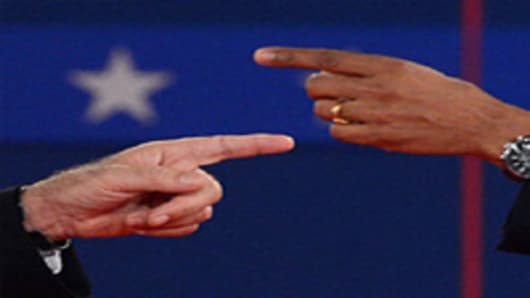It was a fact-checker's dream.
The two major candidates for president, standing practically toe-to-toe, with contradictory versions of a basic fact: the level of oil production on public lands.
"Production on government land, ..." Mitt Romney began.
"Production is up, " President Barack Obama interrupted.
"Is down, " Romney insisted.
"No, it isn't."
"Production on government land of oil is down 14 percent."
"Governor…"
"And production of gas…"
"It's just not true."
The exchange came in response to just the second question of the debate, from Phillip Tricolla of Long Island, N.Y., who asked the president about gas prices. Romney pounced on Obama's response that the most important thing the nation can do is "control our energy, " claiming overall production under his administration is up.
So who is right?
Our Investigations Inc. fact-checking team scoured the database of the U.S. Department of Energy's Energy Information Administration, which keeps records going back to the 1920s. We found Romney's statistic on oil production misleading. But Obama's claim of credit for increased domestic production is misleading as well.
Here are the official government numbers:
In 2008, the year before Obama took office, sales of crude oil produced on federal lands totaled 575 million barrels. The number jumped to 642 million in 2009, and 739 million in 2010. But public lands include "lands" offshore. And following the Deepwater Horizon disaster on April 20, 2010, the Obama administration declared a temporary moratorium on offshore drilling. Largely as a result, sales dropped to 646 million barrels in 2011 — the 14 percent drop Romney cited.
(Read More: Debate II: Obama Goes on Offensive Against Romney )
The 2011 figure was still higher than it was when the president took office, however. And analysts have predicted when 2012 is over, the number will be higher still. In fact, a Citigroup report says "production is bouncing back" since the moratorium was lifted, and this year the U.S. "could well recoup the depletion it lost since 2010."
Romney should know the report well, since his campaign cites it in a white paper on energy policy issued on Aug. 23. The report says North America is already on a path to energy independence by 2020 — a Romney campaign promise.
But as we first reported in September, it is a stretch for the president to claim credit for the nation's improvement on energy self-sufficiency. U.S. crude oil production is at its highest level since 1998, according to the EIA. That is a 14-year high instead of the 16-year high the president claimed, but still seems impressive. Except that the trend began long before Obama took office, starting when production began to rebound following Hurricanes Katrina and Rita in 2005.



